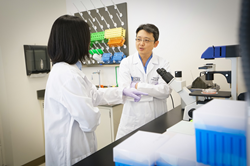
Dr. Fumito Ito and team’s research on a new biomarker is published in the journal Nature Communications
“This study sheds light on a promising blood-based biomarker that is potentially very useful in identifying which patients with lung cancer are most likely to benefit from immunotherapy. We look forward to investigating its utility in further clinical research.”
BUFFALO, N.Y. (PRWEB)
March 03, 2021
Discovery in lung cancer could help determine which patients will benefit most from immunotherapy
- Durable responses to immune checkpoint inhibitors are limited
- New biomarker predicts response to immune checkpoint inhibitors
- Roswell Park team is planning an interventional study based on these findings
A team of Roswell Park Comprehensive Cancer Center researchers has identified a new biomarker that could predict response to immune checkpoint inhibitors (ICI) shortly after patients with non-small cell lung cancer (NSCLC) initiate therapy. This discovery, published today in the journal Nature Communications, is not only an important step forward in lung cancer treatment, but also has implications for other malignancies, according to lead author Fumito Ito, MD, PhD, FACS.
“Although ICIs revolutionized the cancer treatment for significant numbers of people, many cancer patients do not respond to them, and some develop severe toxicity,” says Dr. Ito, who is Associate Professor of Surgical Oncology and a member of the Center for Immunotherapy at Roswell Park.
Pretreatment biomarkers such as PD-L1 expression, frequency of tumor-infiltrating lymphocytes and tumor mutational burden are of limited value in guiding decisions about which patients are likely to respond well to checkpoint inhibitors. Tumor biopsy shortly after the initiation of ICI therapy can provide helpful information, but is invasive and difficult to do in patients with a cancer in a visceral, or internal, organ — such as lung cancer.
Uncovering blood-based biomarkers that reflect the change of the tumor microenvironment and can predict a patient’s response to ICIs could improve current treatment regimens significantly, Dr. Ito notes. Previous work from this group indicates that T cells with varying levels of the chemokine receptor CX3CR1 responded differently to immunotherapy with checkpoint inhibitors.
Building off these findings, the researchers sought to test the utility of that protein, CX3CR1, as a T-cell biomarker for ICI therapy. They found that effective checkpoint inhibition therapy correlates with increased frequency and clonality of some CX3CR1-positive T cells; that the frequency of these CD8+ T cells remained elevated during ICI therapy; and that there are many genomic similarities between CD8+ tumor-infiltrating lymphocytes (TILs) and this subset of CX3CR1-positive T cells.
To test this in patients, the researchers obtained serial blood samples from patients with NSCLC undergoing anti-PD-1 therapy. The team, which also included two Roswell Park medical oncologists, Grace Dy, MD, Chief of Thoracic Oncology, and Hongbin Chen, MD, PhD, Associate Professor of Oncology, observed that changes in the frequency of CX3CR1 in blood are associated with a response to ICI therapy.
Dr. Ito and colleagues labeled the percent change of the CX3CR1-positive subset in blood CD8+ T cells from baseline as a “CX3CR1 score,” and observed that a CX3CR1 score of at least 20 was highly accurate in predicting response and prognosis of NSCLC patient undergoing anti-PD-1 therapy.
“Currently, we are in need of a better biomarker to predict the response to immunotherapy, which is part of standard treatment in advanced and metastatic lung cancer,” says Dr. Chen. “This study sheds light on a promising blood-based biomarker that is potentially very useful in identifying which patients with lung cancer are most likely to benefit from immunotherapy. We look forward to investigating its utility in further clinical research.”
The team plans clinical studies to further explore how useful this biomarker may be in guiding treatment decisions for cancer patients.
This work was supported by grants from the National Cancer Institute, or NCI (project number P30CA016056) and the National Center for Advancing Translational Sciences of the NIH (project number UL1TR001412). Additional funding was provided by Roswell Park Alliance Foundation, the Melanoma Research Alliance, Department of Defense Lung Cancer Research Program (LC180245), Uehara Memorial Foundation, Astellas Foundation for Research on Metabolic Disorders and the Nakatomi Foundation.
###
An online version of this release is available on our website.
Roswell Park Comprehensive Cancer Center is a community united by the drive to eliminate cancer’s grip on humanity by unlocking its secrets through personalized approaches and unleashing the healing power of hope. Founded by Dr. Roswell Park in 1898, it is the only National Cancer Institute-designated comprehensive cancer center in Upstate New York. Learn more at http://www.roswellpark.org, or contact us at 1-800-ROSWELL (1-800-767-9355) or ASKRoswell@RoswellPark.org.
Share article on social media or email:

